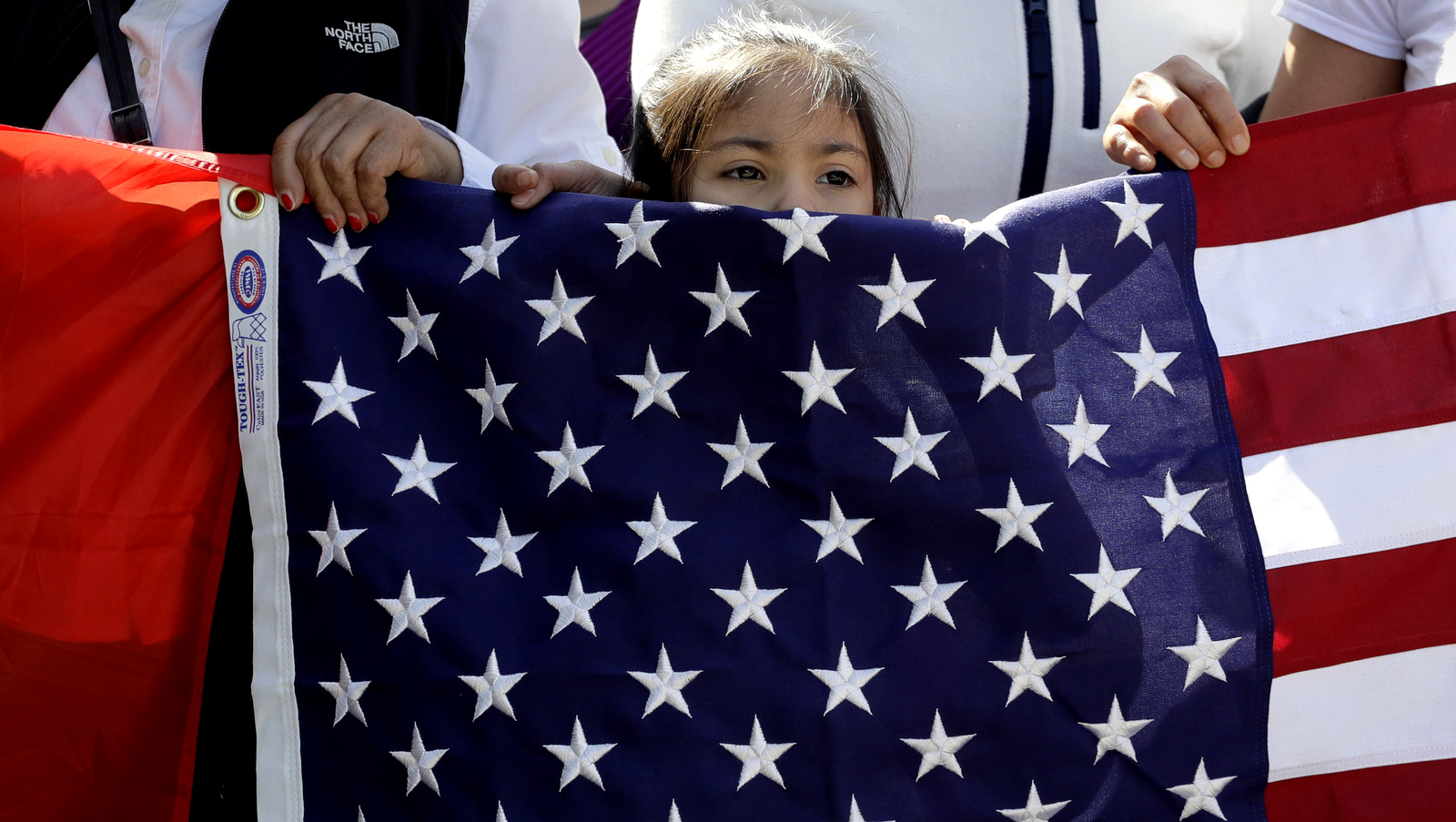
A young girl helps hold a U.S. flag during pro-immigration rally, Feb. 16, 2017. (AP/Eric Gay)
NEW ORLEANS – In a groundbreaking ruling for immigrants who say a Louisiana law denies them the right to marry, a federal judge Tuesday granted a Vietnamese man’s petition to marry his fiancée without first showing his birth certificate.
Act 436, signed into law in July 2015 and in effect since January 2016, “is an unlawful state attempt to usurp federal immigration law,” Viet “Victor” Anh Vo said in his October 2016 lawsuit.
Vo was born in an Indonesian refugee camp after his parents fled Vietnam. He is a U.S. citizen now and has been since childhood, but Act 436 has kept him and his girlfriend, and many other foreign-born citizens, from marrying in Louisiana.
The law places additional burdens on foreign-born applicants and their spouses, making it difficult if not impossible to obtain marriage certificates, Vo said in his complaint.
Though he is a U.S. citizen he has no birth certificate, as he was not issued one in the refugee camp and was not given one upon entering the United States either.
Vo, 32, has lived in Louisiana since he was 3 months old and became a U.S. citizen when he was 8.
Related | ‘Statue Of Liberty Weeps’ As Trump Takes Aim At Legal Immigration
In 2016, when Vo and his girlfriend decided to marry, they went to several Louisiana parish clerks and were denied a marriage license in all of them because Vo does not have a valid birth certificate, a valid and unexpired passport, or an unexpired visa: the documents required under Act 436.
Under Act 436, U.S. citizens who were born in the United States and do not have birth certificates may file paperwork exempting them from the birth certificate component of the marriage license, but foreign-born citizens cannot.
U.S. District Judge Ivan Lemelle, a Bill Clinton appointee, ruled Tuesday that Act 436 is unconstitutionally discriminatory.
“The State of Louisiana fails to demonstrate in their opposition that this classification based on national origin furthers a compelling governmental interest that justifies treating this plaintiff and other similarly situated U.S. citizens differently from U.S. born citizens merely because of where they were born,” Lemelle wrote. “Based on the undisputed facts and controlling case law it is clear that these classifications are unconstitutional.”
Lemelle found the act also violated Vo’s fundamental right to marry.
“The current birth certificate provisions completely bar the plaintiff from obtaining a marriage license,” Lemelle wrote.
The state sought a declaration that Lemelle’s ruling would apply exclusively to Vo.
Lemelle refused.
“It is ordered that defendants and their officers, agents, servants, and employees are permanently enjoined and restrained from enforcing Act 436 insofar as it unconstitutionally deprives U.S. citizens like plaintiff and similarly situated U.S. citizens the right to marry based on national origin,” the ruling states.
Former Louisiana Gov. Piyush “Bobby” Jindal, who was born in Louisiana to an immigrant Indian-national father, signed Act 436 in July 2015. Before Act 436 took effect, the rules for obtaining a marriage license were less stringent.
Related | Former Director Of Anti-Immigration Group To Be Named Ombudsman At U.S. Immigration Agency
To obtain a marriage license before Act 436 in, for instance, Orleans Parish, the application could be filled out by either party wanting to marry, and only one of them needed to be present at the courthouse to show documentation for both parties.
The only documentation required before Act 436 was a valid driver’s license, current state ID or a passport, and a birth certificate or a birth card. If for any reason the parties did not have a birth certificate or a birth card, they could apply to have the requirements waived.
In July 2015, before Act 436 took effect, state Sen. Conrad Appel, a Republican, warned that it would be unnecessarily burdensome, and that it would be a “mistake” to use marriage to regulate immigration, according to a statement released by the New Orleans Workers’ Center for Racial Justice, which filed Vo’s lawsuit.
Vo was represented by the National Immigration Law Center, the New Orleans Workers’ Center for Racial Justice, and Skadden, Arps, Slate, Meagher, & Flom.
Mary Yanik, an attorney with the New Orleans Workers’ Center for Racial Justice said in a statement that the “law came from politics of hatred and discrimination, and that’s not what Louisiana stands for.” She continued: “The decision today reflects Louisiana’s proudest legacy, as the birthplace of movements for human and civil rights.”
Skadden Arps attorney Marley Ann Brumme added: “We are thrilled with the court’s decision to permanently extend the protections provided by its earlier ruling. Mr. Vo can finally marry his partner in their home state of Louisiana without the burden of unconstitutional requirements imposed solely because of the place of his birth, and we are happy to have had the opportunity to help Mr. Vo in vindicating his rights and those of other Louisianans similarly situated.”
The ruling comes a half century after Loving v. Virginia, which upheld the rights of people to marry regardless of ethnicity or race.
© Courthouse News Service
Stories published in our Hot Topics section are chosen based on the interest of our readers. They are republished from a number of sources, and are not produced by MintPress News. The views expressed in these articles are the author’s own and do not necessarily reflect Mint Press News editorial policy.
Source Article from http://www.mintpressnews.com/federal-judge-strikes-down-louisiana-law-restricting-immigrants-right-to-marry/230707/
 RSS Feed
RSS Feed















 August 10th, 2017
August 10th, 2017  Awake Goy
Awake Goy 




 Posted in
Posted in  Tags:
Tags: 













